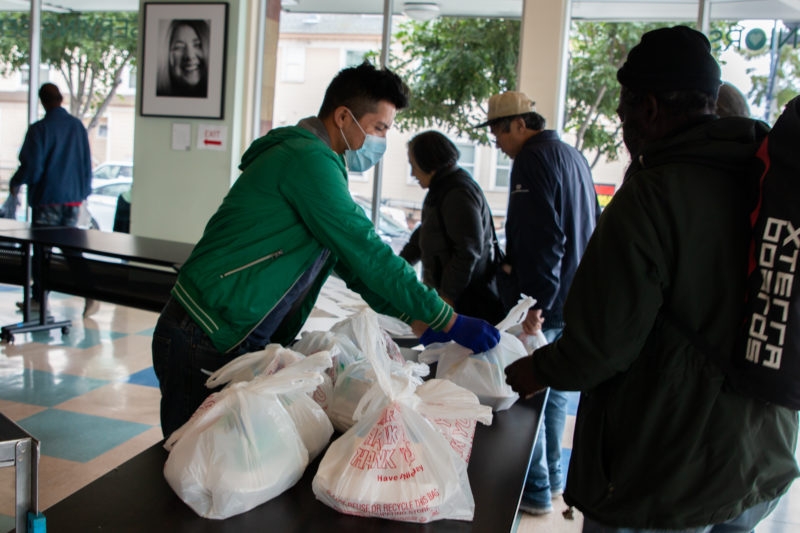
San Diego is changing every day amid the spread of coronavirus. Schools are closed, the city is shuttering non-essential functions and those on the front lines are doing what they can to meet everyone’s needs.
We wanted to see for ourselves how the community is responding. Here’s what we found.

Seniors and other vulnerable populations have been hit especially hard.
We visited the Serving Seniors’ Gary and Mary West Senior Wellness Center in downtown over the weekend to see how new county regulations have affected the nonprofit’s ability to serve its residents. Its dining halls are usually filled with hundreds of seniors each morning for breakfast and each afternoon for lunch.
Photo by Adriana Heldiz

Now, staff are preparing meals to go. The center was directed by the county Thursday afternoon to shut down its usual gatherings for meal services. On Sunday morning, dozens of seniors instead waited in line for a warm, packaged meal.
County health officials have since barred all public and private gatherings of at least 50 people, forced bars and nightclubs to shutter and banned in-person dining at local restaurants.
Photo by Adriana Heldiz

Despite new challenges that seem to arise each day, nonprofits that run assistance programs are pressing ahead.
Meals on Wheels, an organization that delivers meals to seniors at home, is operating as normal, said spokeswoman Joice Truban Curry. The organization is calling for help from younger community members because a lot of its volunteers are themselves older and more vulnerable.
Father Joe’s Villages also said it’s working in partnership with the city, county, Health Center Partners, other homeless service agencies and UC San Diego to create and implement an action plan. The nonprofit continues to offer showers seven days a week though the San Diego Day Center and is working with the county to provide hand-washing stations in the community.
Photo by Adriana Heldiz

School officials made the difficult decision to close schools across the entire region beginning Monday, knowing that many students may go without food or care and that many will fall behind on learning.
Now, many districts are offering free meals to go. Outside of the San Diego Unified School District’s Clark Middle School this week, district staff and campus police distributed packaged meals and fresh vegetables to families.
Photo by Adriana Heldiz

Most districts in the county have announced designated sites where families can receive free food while schools are closed. This list from the San Diego County Office of Education has the most comprehensive information.
Photo by Adriana Heldiz

Once schools closed, city libraries followed close behind. The city announced Friday the complete closure of all public facilities, including libraries, recreational centers and public pools through April 6.
The San Diego County Library has also suspended its public programs in all branches of the county through at least the end of March to comply with county guidelines. It has started a curbside pickup program for those who would still like to access books and other library items.
Photo by Kayla Jimenez

As the outbreak affects more San Diegans, public officials warn that we should not expect many people to be tested. The county public health lab announced it had about 1,200 tests as of last week and is looking at ways to increase capacity.
Commercial labs and local hospitals are developing the capabilities to test as well.
At Scripps Health in La Jolla, a “COVID cabana” with drive-up testing is now open for those who have been referred.
For the most up-to-date information on guidance from local and state officials, view our reader’s guide. If you have questions about San Diego’s response to the coronavirus, let us know by using this form.
Photo courtesy of Scripps Health

